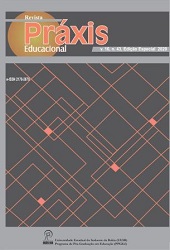TEACHING TO TEACH: GUIDELINES AND STRATEGIES TO IMPROVE TEACHER TRAINING IN HIGHER EDUCATION
DOI:
https://doi.org/10.22481/rpe.v16i43.6929Keywords:
Teacher training, Higher education, Student-centred learningAbstract
The debate on the quality of university teacher education is more than ever a relevant issue. It is a topic which frequently appears in specialized journals about Higher Education and is often examined in a scientific context. This article takes up some of these complicated issues and illustrates with examples taken from a study at the University of Bari.
Downloads
Metrics
References
ARONSON, J. (ed.), Improving Academic Achievement. Impact of Psychological Factors
on Education, Academic Press, San Diego (CA) 2002.
BENJAMN, J. What University Teachers Teach and How Do They Teach It? in Hativa N., Goodyear P. (eds), Teacher Thinking, Beliefs and Knowledge in Higher Education, Kluwer Academic Publisher, Dordrecht 2001.
BOEKAERTS, M.; PINTRICH P.R.; ZEIDNER, M. (eds.), Handbook of Self-Regulation, Academic Press, San Diego (CA) 2000.
BONNIOL, J. J.; VIAL, M., Les modéles de l’évaluation, De Boeck-Larcier, Bruxelles 1997.
CARRE, P. MOISAN, A. La formation autodirigée: Aspects psychologiques et pédagogiques, L’Harmattan, Paris 2002.
DEBRY, M.; LECLERCQ, D.; BOXIJS, E. De nouveaux défies pour la pédagogie universitaire, in Leclercq D., Pour une pédagogie universitaire de qualité, Mardaga, Sprimont (Belgique) 1998.
DONALD, J.G. Science Student’s Learning Ethnographic Studies in Three Disciplines, in Pintrich P.R, Brown D.R., Weinstein C.E. (eds.), Student Motivation, Cognition and Learning, Lawrence Erlbaum Associates Pubhlishers, Hillsdale (NJ) 1994.
ECCLES, J.S.; WIGFIELD A. (ed.). Development of Achievement Motivation, Academic Press, San Diego (CA), 2002.
ENTWISTLE, N.; TAIT, H. Approaches to Learning, Evaluation of Teaching and Preferences for Contrasting Academic Environments, in “Higher Education”, n. 19, 1990.
HATIVA, N. RAVIV, A. University Instructors’ Ratings Profiles: Stability over Time, and Disciplinary Differences, in «Research in Higher Education», 37 (3), 1996.
LANEVE, C. Du banc de l’école a’ la chaire du professeur. Le role de la memoire dans le métier d'enseignant, Séminaire Open, Paris, Les 2 et 3 Juin 2005.
LANEVE, C. Training is the Topos which Encompasses All the Complexity of the Research in the Field of Teaching in 29th Annual Conference “Teacher Education between Theory and Practice”, ATEE (Association for Teacher Education in Europe), Agrigento 23-27 October 2005.
LE BOTERF, G. Construire les compétences individuelles et collettives, Éditions d’Organisation, Paris 2000.
LENOIR, H.; LIPIANSKY, E. M. Recherches et innovations en formation, L’Harmattan, Paris 2003.
SCHRAW, G. (ed.). Metacognitive Assessment, University of Nebraska Press, Lincoln, 2000.
SCHUNK D.H., Learning Theories: An Educational Perspectives, 3 rd, Upper Saddle River, NJ, Merrill/Prentice Hall 2000.
STERNBERG, R. J. (e.d.). The Psychology of Problem Solving, Cambridge University Press, Cambridge 2003.
TRIGWELL, K.; MARTIN, E. Qualitative Differences in University Teaching, in Tight M. (ed), Access and Exclusion, JAI Elsevier, Oxford 2003.
TRIGWELL, K.; PROSSER, M. Understanding Learning and Teaching: The Experience in Higher Education, Open University Press, Buckingham 1999.
VOLET, S., JÄRVELÄ, S. (eds.). Motivation in Learning Contexts: Theoretical Advances and Methodological Implications, Pergamon, Amsterdam 2001.
Downloads
Published
How to Cite
Issue
Section
License
Copyright (c) 2020 Práxis Educacional

This work is licensed under a Creative Commons Attribution-ShareAlike 4.0 International License.
You are free to:
Share - copy and redistribute the material in any medium or format; Adapt - remix, transform, and build from the material for any purpose, even commercially. This license is acceptable for Free Cultural Works. The licensor cannot revoke these freedoms as long as you follow the terms of the license.
Under the following terms:
Attribution - You must appropriately give credit, provide a link to the license, and indicate if any changes have been made. You may do so in any reasonable way, but not in a way that suggests that you or your use is endorsed by the licensor.
There are no additional restrictions - You cannot apply legal terms or technological measures that legally restrict others to make any use permitted by the license.










